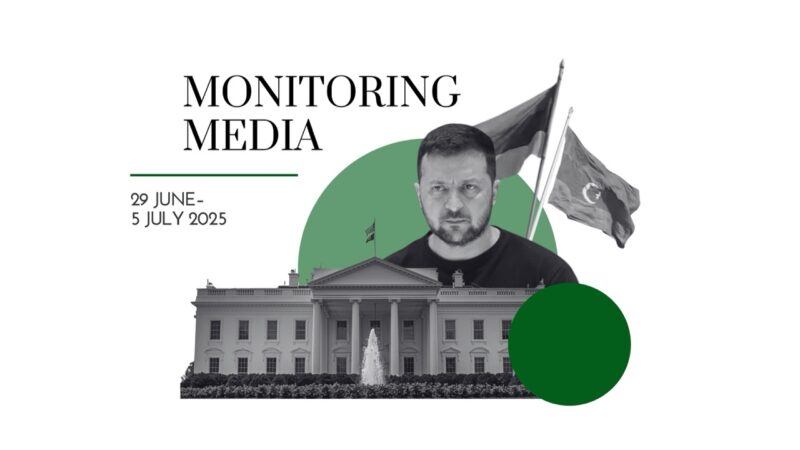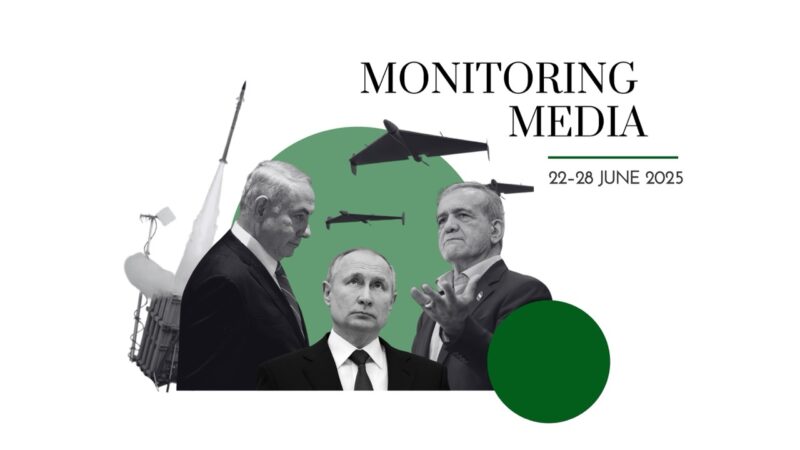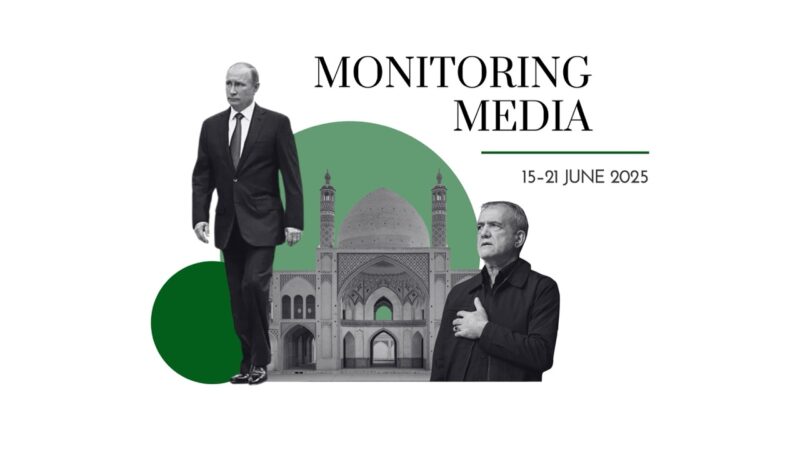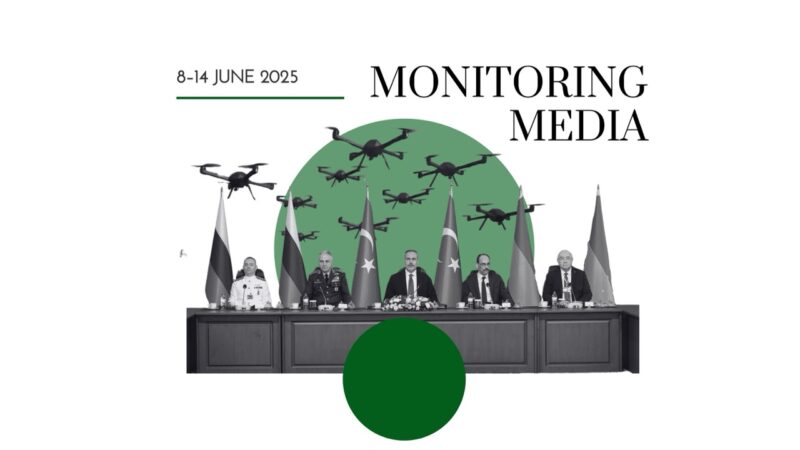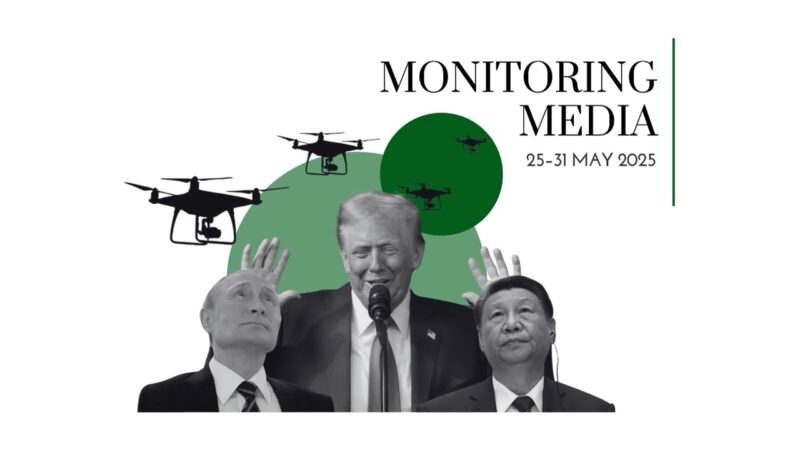Russians advance under Bakhmut but suffer unprecedented casualties

CIUS weekly report on North American media coverage of Ukrainian affairs, 4–10 March 2023
Three publications (The Conversation, The New Yorker, and National Review) were selected to prepare this report on how the situation in Ukraine has been portrayed in the North American press during the past week (4–10 March 2023). The sample was compiled based on their impact on public opinion as well as on their professional reputation, popularity among the readership, and topical relevance. These three publications represent centrist and conservative viewpoints on the political spectrum.
This report covers only the most-read and relevant articles about Ukraine, as ranked by the respective North American publications themselves in the past week. Its scope covers promoted articles on home pages and articles from special sections on Ukraine, with the hashtag #Ukraine, from the paper editions of the publications, and about Ukraine from opinion columns and editorials.
Topics featured in the selected articles:
- Ukraine’s current affairs: the war has accelerated the formation of Ukraine as a political nation; Kharkiv residents are active in the restoration of their urban infrastructure and in volunteering to defend the city on the battlefield;
- The world and Ukraine: increasing support to Ukraine is in the USA’s national interest; the Global South states do not regard the Russo-Ukrainian war as affecting their security; Gareth Jones’ articles about Ukraine from the 1930s set a benchmark for contemporary journalism;
- Russia at war: Russia is making incremental progress in Bakhmut, albeit at enormous cost; Russia’s failure to hold Bakhmut will likely destabilize its domestic power vertical; for many anti-war residents of Moscow, it is safer to move to Ukraine than stay in Russia.
Main arguments:
Ukrainians demonstrate unprecedented nationwide unity in the face of the invasion. Erik S. Herron and Ralph S. Clem (The Conversation) argue that “once divided, Ukrainians are thinking about how to rebuild their nation and are prioritizing national interests over regional ones.” Regardless of the immense destruction, losses, and suffering that the Russian invasion has brought, Ukrainians are united around the idea of preserving their statehood—thereby denying a rather popular myth in the West that Ukraine’s society is a divided one, as well as renouncing Putin’s narrative that Ukrainians and Russians are one people. Herron and Clem highlight that the Euromaidan in 2014, the pro-European reforms that followed, and the all-out Russian invasion in 2022 became instrumental in the formation of the modern Ukrainian political nation. Following the full-scale invasion, the regional differences in Ukraine started disappearing; unlike in 2014, in 2022 the southern and eastern parts of the state demonstrated support for the pro-European policies of the government and increasingly switched to using the Ukrainian language. When discussing post-war reconstruction priorities, Ukrainians also demonstrated trans-regional congruence: “people consistently supported rebuilding national defence, housing, and energy at roughly the same level and well above other needs like health care, education, communications, and transportation.” Herron and Claim conclude that “superficial snapshots in time that made the case for Ukraine’s being a ticking time bomb because of its internal differences have been dramatically debunked as the country has united to fight an existential war of survival.” However, the analysts also emphasize that measuring public opinion in wartime has its pitfalls, as the respondents may address questions emotionally.
Kharkiv residents contemplate war damage and try to gradually return to normal life. Masha Gessen (New Yorker) tells the story of Volodymyr Matias, an accomplished architect from Kharkiv who became a tram driver in the aftermath of the Russian invasion and thereby contributed to the city’s resilience. In the example of Matias’ story, Gessen highlights how the attitudes of ordinary residents of Kharkiv changed toward Russians during the year of fighting. At the very beginning of the escalated invasion very few people believed that Russian soldiers were killing Ukrainians indiscriminately—until the evidence arrived from Bucha. Afterwards, angry and disappointed, the residents of Kharkiv learned to live under the air attacks and could even continue shopping with munitions exploding nearby. They learned to distinguish artillery by ear and endure the bombardments in Cold War–era bunkers, having restored them. Gessen writes that after the wave of powerful attacks in February 2022, the public transportation network in Kharkiv collapsed—specifically, rail transportation. The debris crammed tram lines, dozens of carriages were destroyed, and the movement of passengers across the city became risky and unwarranted. Therefore, when Russians were pushed out of the Kharkiv suburbs in late May 2022 and the intensity of bombardments shrank, Matias drove a tram out of the depot for the first time. That ride carried a powerful symbolic message, and people reacted to it with cheering and clapping: “Volodymyr felt like driving the tram heralded the rebirth of the city.” Gessen concludes that Matias abandoned his profession as an architect not least because “no one [was] going to invest in building in a city under bombardment.” Instead, he decided to make his pre-war hobby a new profession, because tram drivers were indispensable for the city’s revitalization.
Kharkiv residents write a history of Ukraine’s war effort. Masha Gessen (New Yorker) presents another story—this one of Vasyl Bilous, an assistant professor of forensics at the National Law University in Kharkiv and a lawyer in private practice. In peaceful times he contributed to civic resistance against government overreach. When the invasion broke out, he became a member of an aerial-intelligence unit at the front line: “He flies [drones] behind enemy lines, looking at what the camera on his drone can see on the screen of his cell phone. When he spots, say, a tank, then he taps the screen to get the coordinates of the object and transmits these to an artillery unit.” Whenever the drone gets jammed, Bilous makes it land and afterwards needs to traverse the “grey zone” between the warring armies, which often is heavily mined, in order to retrieve the aerial vehicle. Gessen also describes the challenges with equipment and accommodation that the army volunteers and recruits had to endure in the first days of the invasion. In the example of Bilous, Gessen describes the daily life of Ukraine’s defenders, the tons of sweat they have shed from experiencing terrifying situations, and their growing respect for the Ukrainian flag and traditions.
Western reporters should learn from Gareth Jones’ publications about Ukraine. Richard Sambrook (The Conversation) writes a story of Welsh journalist Gareth Jones, who went to the Soviet Union in the 1930s and tried to inform the world about the Holodomor in Ukraine. Sambrook highlights that Jones’ “eyewitness reports, gathered at significant risk, were initially disbelieved and dismissed at a time when many in the west were supportive of Stalin as a potential ally against the growing Nazi threat in the early 1930s.” However, as the present pre-war events unfolded, Jones’ articles were re-evaluated. Sambrook presents a short biography of Jones and argues that “his achievements, which hold lessons for today’s reporters, are still not well known.” Little is also known about his death, on the eve of his 30th birthday; Sambrook suspects that Jones was murdered by the NKVD. Speaking of lessons for today’s reporters, Sambrook argues that in the age of digital media and mass communication, “there is no substitute for eyewitness reporting and for reporters taking the risks to see for themselves what is happening.” Apart from this, “cries of ‘fake news’ must be countered with hard evidence.” Last but not least, professional reporting may today be a more dangerous occupation than ever before.
It is in the US’s interest to increase its supplies of equipment and ammunition to Ukraine. Robert Zubrin (National Review) opens his article with a statement that “Biden’s policy has been to send Ukraine enough arms to avoid defeat but not enough to win. Republicans should not be searching for a policy that’s even worse.” He highlights the fact that two camps exist within the Republican party: members of the first camp call for giving Ukraine all the weapons it needs to win, while members of the second camp call for “cutting off arms shipments to Ukraine, thereby letting the Russians win.” Zubrin argues that reducing support for Ukraine is a bad strategy for the US national interest. First and most important, such a strategy would guarantee the defeat of Ukraine and therefore the defeat of the US as its partner (similarly to what happened in Afghanistan). Second, Russia’s victory in Ukraine would “cripple America and the West on the world stage…discredit the US as an ally, thereby [disrupt] the Western alliance in both Europe and Asia.” Thirdly, such a strategy would lead to a Ukraine’s completely unnecessary defeat—instead of properly arming troops that are willing to fight, the US would make them bleed out: “We have over 6,000 tanks, 2,000 MLRS-type units, 3,700 ATACMS, and 2,000 F-16s. Were we to send 10 percent of each to Ukraine, the war could be won by summer.” Zubrin concludes that while the policy of the Biden Administration toward Ukraine is far from perfect, the Republican party should not try to make it worse.
Furthermore, Matthew Continetti (National Review) adds that President Biden “has played into Vladimir Putin’s nuclear gamesmanship by preemptively ruling out measures that the Russian despot might consider escalatory.” He also writes that the US has given Ukraine a fighting chance with its support, yet the support has remained unsustainable since February 2022: “By practicing self-deterrence and by resisting calls to dramatically expand defense production and ramp up weapons transfers, Biden has reproduced the conditions of past ‘forever wars’ that America and her allies have stalemated or lost.” The loss of Ukraine in this war, if it happens, will encourage other aggressors to start military conflicts in the Persian Gulf, the Korean peninsula, and the Taiwan Strait. Therefore, the US should develop a strategy to make Ukraine win, because only victory can bring genuine and long-lasting peace.
Global South states do not perceive the Russo-Ukrainian war as a matter of their national interest. Melissa Conley Tyler (The Conversation) highlights that there exists no universal condemnation of the Russian invasion of Ukraine that could be observed in the mixed reactions to Sergei Lavrov’s provocative statements during India’s premier geopolitics forum, the Raisina Dialogue, in early March. In particular, when the Russian Foreign Minister mentioned that it was Ukraine who launched the war against Russia, a part of the audience laughed; another part showed support for the Kremlin’s narrative—predominantly representatives of countries of the Global South. Conley Tyler argues that the positive perception of the Kremlin’s narratives stems from three factors: past and existing links between specific states and Russia, above all arms trade (e.g., India, Vietnam, and Laos); dissatisfaction with the US-led Western policies that many states regard as hypocritical (e.g., 2003 intervention in Iraq); and dissatisfaction with the indirect impact of the war on developing states (e.g.. food shortages). At the same time, Conley Tyler mentions that many states of the Global South choose to disengage from the Russo-Ukrainian war because they perceive it either as a competition between great powers or as a conflict of inferior importance compared to their own challenges. Conley Tyler concludes that “if the West wants developing countries to care about its concerns, it needs to care about the issues that matter to the developing world. Development and defence are linked.” She also highlights that India may become a bridge between the Global North and South, and particularly a mediator in the Russo-Ukrainian war: it geographically belongs to the North, economically to the South, culturally to the East, and politically to the West (being the world’s biggest democracy).
If this happens, the defeat at Bakhmut would launch a chain of destructive political processes within Russia. James Horncastle (The Conversation) opens his article with an assertion that the ongoing battle of Bakhmut, though being of dubious strategic importance, acquired a profound symbolic meaning for both sides and epitomizes the limitations in Moscow’s effort. The battles that are regarded as symbolic are often fought to pursue political objectives instead of strategic advantages. For Ukraine, the successful defence of Bakhmut is a statement that Russians will never have it easy invading Ukraine and will eventually be expelled from all of the state’s territory. For Russia, to claim victory over Bakmut means achieving one of the major goals behind the invasion, which is the alleged protection of the ethnic Russian-speaking population in the Donbas—the area that has been portrayed as an inalienable part of Russian identity since the 1920s. Apart from this, defeat at Bakmut, if it happens, will make Putin’s regime more fragile at home, demonstrate limitations to the Russian prowess, as well as magnify collisions between Russian elites and clans. Therefore, the invaders seem to have lost up to 20.000 soldiers in human wave attacks, yet continue storming the town for the tenth month already. One of the most battle-capable Russian units fighting for the town is the private military company Wagner Group. Therefore, if Bakhmut falls, the political authority of Yevgeny Prigozhin, the Wagner Group’s leader, will increase in Russia. Such a prospect looks unacceptable for other actors and bolsters the idea for the Russian army command to confront Prigozhin. An uninterrupted supply of scarce ammunition to the Wagner Group has recently become the core of the mentioned confrontation.
Russia could eventually achieve a grinding victory at Bakmut. Jim Geraghty (National Review) provides an overview of publications from different media on the situation around Bakhmut and concludes that Russians might conquer the town soon. Such a development would carry a more symbolic rather than strategic value; nevertheless, it will also make one point clear: Russians are more successful in waging a grinding war: “Bakhmut proves that the course of the war is unpredictable, and that even if the Ukrainians have the advantage of better weapons, better technology, better intelligence, and a righteous cause, the Russians can just keep dumping more and more men into the battle and wear the Ukrainians down.” Geraghty highlights that the casualties among Russians are unprecedentedly high, but Ukrainians, being constantly attacked from three sides, should not remain unscathed either: “Russia could pay the price for prolonged bloodbaths in a way that the Ukrainians can’t.” Geraghty also writes that to popularize the cause of Ukraine among US citizens, President Biden portrays the necessity to help defenders as a phase in the US quest to strengthen the “rules-based international order.” This is a good portrayal but insufficient to shape the dominant public opinion. Geraghty believes that the President should appeal to the national interest in the first place and explain to US citizens that Ukraine has become a stakeholder in their security and prosperity. Such an explanation will work much better than appeals to the abstract “rules-based international order.”
In turn, Christopher Morris (The Conversation) argues that Russia’s success at Bakhmut is far from being set in stone. In March, the Russian offensive will inevitably be slowed down by the spring thaw. The latter will bring mud and rain, restrict freedom of maneuverability, and confine most Russian movement to main roads and rail networks. Rasputitsa will also deteriorate Russia’s logistics, which have never been good in the first place: “Russia lacks the capacity to sustain operations at any real distance from its depots and rail networks. Its limited inventory of supply vehicles struggles to replenish ammunition, food and fuel at the rates they are expended.” Morris concludes that the most intensive stage of fighting will likely take place in April when “both sides will seek to take advantage of warmer, dryer conditions,” as well as put all their winter time preparations into practice.
Some Russians opposing the war find it reasonable to move to Ukraine regardless of the dangers. Masha Gessen (The New Yorker) writes about the adventures of Alex Stone and Halyna Rusanova, a same-sex couple from Russia who fled Putin’s regime into Ukraine in their act of protest against the war. Among other things, Gessen highlights that living in Moscow with a Ukrainian passport risks death; Russians can not leave their country through Poland to enter Ukraine afterwards; buckwheat and canned goods can be used instead of currency in the occupied territories; Ukrainian soldiers and officers can be reasoned with, and they offer a modicum of help even to Russian civilians; Russians cannot apply for asylum in Ukraine; and Russians cannot go out into Ukrainian cities freely, as they risk harassment or even detention. Gessen concludes her story that Alex and Halyna plan on leaving Ukraine: “They can take the train to Odesa, avoiding checkpoints, and then a bus to Moldova. They plan to get married online, in Utah, and then, perhaps, to make their way to a country that recognizes same-sex marriage and doesn’t require visas for Russian citizens. Costa Rica is such a country.”
